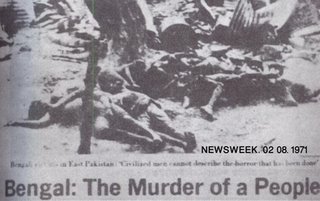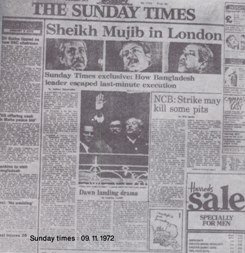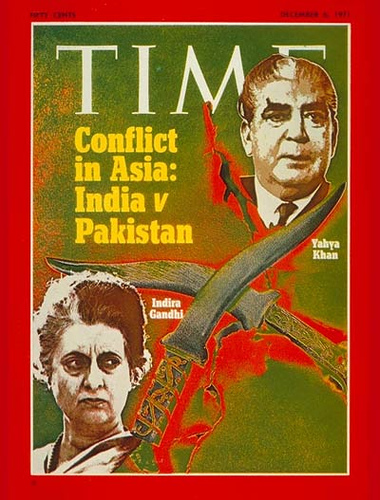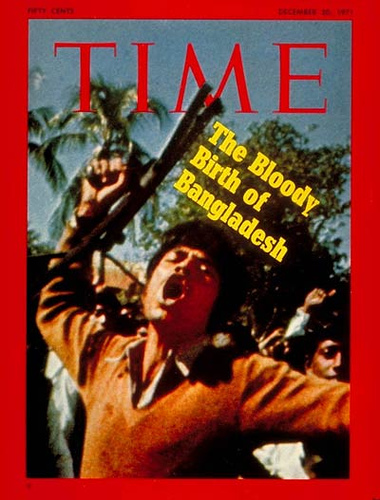
On March 25, 1971 the Pakistani military forcibly confined all foreign reporters to the Hotel Intercontinental (currently the Dhaka Sheraton) in Dhaka. That night after 11pm the military launched its genocide campaign against the Bengali civilian population of then East Pakistan. The reporters were able to see the tank and artillary attacks on civilians from their hotel windows.
Two days later, as Dhaka burned the reporters were expelled from the country – their notes and tapes were confiscated. One of the expelled reporters was Sidney Schanberg of the New York Times. He would return to East Pakistan in June 1971 to report on the massacres in Bengali towns and villages. He would again be expelled by the Pakistan military at the end of June.Two foreign reporters escaped the roundup on March 25. One of them was Simon Dring of the Daily Telegraph. He evaded capture by hiding on the roof of the Hotel Intercontinental. Dring was able to extensively tour Dhaka the next day and witness first hand the slaughter that was taking place. Days later Simon Dring was able to leave East Pakistan with his reporter’s notes. On March 30, 1971 the Daily Telegraph published Simon Dring’s front page story of the slaughter in Dhaka that the army perpetrated in the name of “God and a united Pakistan”.
Click here for selected quotes from different international Newspaper reports. You can find various chronological reports in the tables below. Click the live links to read the reports.
The massacres in Dacca were only part of the story however. The Pakistan army had begun a campaign of genocide that extended to all major cities and towns in Bangladesh and then moved out into the countryside to terrorize, murder and rape Bengali villagers. With foreign reporters expelled and a complete news censorship in place, the Pakistan army declared that the situation in East Pakistan was “normal”.However as Bengali refugees fled to neighboring India they brought with them stories of horror. The refugee flow had reached millions and by December 1971 about 10 million Bengalis had fled East Pakistan.
In April 1971 the Pakistan army flew in 8 Pakistani reporters from West Pakistan for guided tours with the military. Their mission was to tell the story of normalcy. The reporters went back to West Pakistan after their military guided tours and dutifully filed stories declaring all was normal in East Pakistan. However, one of the 8 reporters had a crisis of conscience. This reporter was Anthony Mascarenhas, the assistant editor of the West Pakistani newspaper Morning News.
On May 18, 1971 Mascarenhas flew to London and walked into the offices of the Sunday Times offering to write the true story of what he had witnessed in East Pakistan. After getting agreement from the Sunday Times he went back to Pakistan to retrieve his family. On June 13, 1971 with Mascarenhas and his family safely out of Pakistan the Sunday Times published a front page and center page story entitled “Genocide”. It was the first detailed eyewitness account of the genocide published in a western newspaper.
 In June of 1971, under pressure and in need of economic assistance, Pakistan allowed a World Bank team to visit East Pakistan. The World Bank team reported back that East Pakistan lay in ruins. One member of the team reported that the East Pakistani town of Kushtia looked “like a World War II German town having undergone strategic bombing attacks” as a result of the Pakistani army’s “punitive action” on the town. He also reported that the army “terrorizes the population, particularly aiming at the Hindus and suspected members of the Awami League”. The Word Bank president, Robert McNamara, suppressed the public release of the report. To no avail. The report was leaked to the New York Times.
In June of 1971, under pressure and in need of economic assistance, Pakistan allowed a World Bank team to visit East Pakistan. The World Bank team reported back that East Pakistan lay in ruins. One member of the team reported that the East Pakistani town of Kushtia looked “like a World War II German town having undergone strategic bombing attacks” as a result of the Pakistani army’s “punitive action” on the town. He also reported that the army “terrorizes the population, particularly aiming at the Hindus and suspected members of the Awami League”. The Word Bank president, Robert McNamara, suppressed the public release of the report. To no avail. The report was leaked to the New York Times.Dispite the Pakistani military’s best efforts at hiding the truth about their genocide campaign against Bengalis, reports filtered out of East Pakistan to the outside world thanks in part to the efforts of determined foreign news reporters. Following are foreign newspaper reports from the beginning of the genocide in March 1971 to its end. They chronicle the bloody birth of Bangladesh.
| June 1971 | ||
|---|---|---|
| 6/9/1971 | New York Times | Disease, hunger and death stalk refugees along India’s border |
| 6/10/1971 | Le Monde, France | Bengal corpses in the wake of a crusading army |
| 6/10/1971 | Reuters | Move to cut Aid to Pakistan |
| 6/10/1971 | Washington Post | East Pakistan : A Wound Unhealed |
| 6/13/1971 | The Sunday Times | EDITORIAL: Stop the killing |
| 6/13/1971 | The Sunday Times | Genocide (Front Page story) |
| 6/13/1971 | The Sunday Times | Genocide (Center Page story) |
| 6/13/1971 | New York Times | Pakistani charges massacre by army |
| 6/18/1971 | LIFE | They are dying so fast that we can’t keep count |
| 6/20/1971 | New York Times | The only way to describe it is hell |
| 6/21/1971 | New York Times | East Pakistan is reopened to newsmen |
| 6/23/1971 | New York Times | EDITORIAL: Abetting repression |
| 6/25/1971 | Hong Kong Standard | EDITORIAL: Another Genghis |
| 6/28/1971 | Newsweek (Page 43-44) | The Terrible Blood Bath of Tikka Khan |
| July 1971 | ||
|---|---|---|
| 7/1/1971 | New York Times | Correspondent of the Times ousted from East Pakistan |
| 7/3/1971 | New Yorker | The talk of the town; Notes and Comments |
| 7/4/1971 | New York Times | An alien army imposes its will |
| 7/4/1971 | New York Times | Hindus are targets of army terror in an East Pakistani town |
| 7/11/1971 | The Sunday Times | A regime of thugs and bigots |
| 7/11/1971 | The Sunday Times | The Repression of Bengal |
| 7/13/1971 | New York Times | World Bank unit says Pakistan aid is pointless now |
| 7/13/1971 | New York Times | Excerpts from World Bank group’s report on East Pakistan |
| 7/14/1971 | New York Times | EDITORIAL: Pakistan condemned |
| 7/14/1971 | New York Times | West Pakistan pursues subjugation of Bengalis |
| 7/14/1971 | The Boston Globe | Plea from CARE |
| 7/16/1971 | New Statesman, London | West Both Sides of Disaster : On refugees |
| 7/17/1971 | New York Times | A Pakistani terms Bengalis ‘chicken hearted’ |
| 7/23/1971 | Wall Street Journal | A Nation Divided |
| 7/31/1971 | The Economist, London | Time is running out in Bengal |
| August 1971 | ||
|---|---|---|
| 8/1/1971 | New York Times | Why they fled |
| 8/1/1971 | St. Louis Post-Dispatch | EDITORIAL: Obligations in Pakistan |
| 8/5/1971 | New York Times | 14 Pakistani aides quit missions in US |
| 8/5/1971 | New York Times | The ravaged people of East Pakistan |
| 8/12/1971 | Daily Telegraph | PICTURE: Senator Kennedy visits refugee camp |
| 8/14/1971 | Far Eastern Economic Review | A people’s war |
| 8/14/1971 | Far Eastern Economic Review | Pakistan – Blow to Confidence Page 1, Page 2 |
| 8/17/1971 | Daily Telegraph | Halt US aid for Yahya, says shaken Kennedy |
| 8/17/1971 | New York Times | Kennedy in India terms Pakistani drive genocide |
| 8/17/1971 | Washington Post | Kennedy charges genocide in Pakistan |
| 8/28/1971 | Far Eastern Economic Review | Who is my neighbor? |
| 8/28/1971 | Los Angeles Times | Pakistan Arms Dispute Exaggerated, U.S. Says |
| 8/28/1971 | Los Angeles Times | India Priest Pleads for Aid in Pakistan Crisis |
| September 1971 | ||
|---|---|---|
| 9/3/1971 | The Times, London | Statement by Dr. Peter Shore, British M.P. |
| 9/4/1971 | Far Eastern Economic Review | East Pakistan: the avengers |
| 9/4/1971 | Los Angeles Times | East Pakistan leaders sworn in |
| 9/11/1971 | Far Eastern Economic Review | Pakistan, a little hope |
| 9/19/1971 | Los Angeles Times | Agha Khan Yields on Constitution |
| 9/23/1971 | New York Times | Bengali refugees say soldiers continue to kill, loot and burn |
| 9/25/1971 | Far Eastern Economic Review | Fighters of Darkness |
| October 1971 | ||
|---|---|---|
| 10/6/1971 | Los Angeles Times | Pakistan Tells U.N. of Acts of War by India |
| 10/10/1971 | The Sunday Times | Pakistan: The propaganda War Page 1, Page 2 |
| 10/14/1971 | New York Times | Horrors of East Pakistan turning hope into despair |
| 10/17/1971 | New York Times | The grim fight for Bangla Desh |
| 10/18/1971 | The Guardian | Dhaka Guerillas start offensive |
| 10/24/1971 | New York Times | Pakistan offers seized TV films |
| 10/26/1971 | The Sunday Times | Stop the slaughter |
| November 1971 | ||
|---|---|---|
| 11/5/1971 | New York Times | Wave of Sabotage in East Bengal as border tension rises |
| 11/9/1971 | New York Times | Bengal Guerillas set up number of assassinations and bombings |
| 11/13/1971 | Los Angeles Times | Rogers Fears Indo-Pakistan War Soon |
| 11/13/1971 | Far Eastern Economic Review | India-Pakistan: UNDECLARED WAR |
| 11/16/1971 | Los Angeles Times | India, Pakistan May Go to War Over East Bengal–and Add to the Suffering |
| 11/17/1971 | New York Times | East Pakistan town after raid by army |
| 11/20/1971 | Far Eastern Economic Review | Faith in Bengal’s Fighters |
| 11/21/1971 | New York Times | Razakars: Pakistani group helps both sides |
| 11/27/1971 | Los Angeles Times | Jessore May Hold Key to Pakistani Outcome |
| 11/27/1971 | Los Angeles Times | U.S. Says It Is Trying to Ease Crisis |
| 11/27/1971 | Los Angeles Times | Heavy Pakistan Fighting reported |
| January 1972 | ||
|---|---|---|
| 1/3/1972 | New York Times | A journalist is linked to murder of Bengalis |
| 1/6/1972 | New York Times | Texts of secret documents on top level US discussions of Indian-Pakistani war |
| 1/9/1972 | Daily Telegraph | Sheikh Mujib flies in and sees Heath |
| 1/9/1972 | New York Times | Backstage with the crisis managers |
| 1/10/1972 | Daily Telegraph | Yahya Khan accused of sex orgies |
| 1/10/1972 | Washington Post | The killings at Hariharpara |
| 1/11/1972 | New York Times | Sheik Mujib home |
| 1/14/1972 | New York Times | Text of memo on Indian-Pakistan war |
| 1/16/1972 | New York Times | Hindu refugees back in Dacca find themselves without homes |
| 1/18/1972 | New York Times | Bengali wives raped in war are said to face ostracism |
| 1/23/1972 | New York Times | ‘I’m alive!’ is still big news |
| 1/24/1972 | New York Times | Bengalis land a vast cemetery |
| 1/30/1972 | Washington Post | Bengalis bodies found |
| February 1972 | ||
|---|---|---|
| 2/5/1972 | New York Times | US sent arms to Pakistan despite pledge to Congress |
| March 1972 | ||
|---|---|---|
| 3/5/1972 | New York Times | Killing of babies feared in Bengal |
| 3/18/1972 | New York Times | India opens way for Dacca trials |
| 3/22/1972 | Washington Post | UN asked to aid Bengali abortions |
| May 1972 | ||
|---|---|---|
| 5/12/1972 | New York Times | Dacca raising the status of women while aiding rape victims |
| July 1972 | ||
|---|---|---|
| 7/23/1972 | New York Times | The rapes of Bangladesh |

Other reports:
TIME Magazine:1969:
April 04, 1969: The army takes over Pakistan
1970:
December 6, 1970: East Pakistan: The Politics of Catastrophe
1971:
April 5, 1971: Pakistan -toppling over the brink
Raise your hand and join me
April 12, 1971: Pakistan: Round 1 to the West
April 26, 1971: Pakistan: The Push toward the Borders
May 3, 1971 : Dacca – The city of the dead
June 21, 1971: The Bengali Refugees: A Surfeit of Woe
July 5, 1971: The most fearful consequence
August 2, 1971: Pakistan: The Ravaging of Golden Bengal
August 23, 1971: Mujib’s secret trial
Oct 25, 1971: East Pakistan: Even the Skies Weep

Dec. 6, 1971: Conflict in Asia: India v Pakistan
Dec. 13, 1971:

Dec. 20, 1971 The Bloody Birth of Bangladesh
Dec. 27, 1971:
Time correspondent Dan Coggin, who covered the war from the Pakistani
side, was in Dacca when that city surrendered. (His report)
1972:
January 3, 1972: Ali Bhutto Begins to Pick Up the Pieces
Vengeance in Victory
January 10, 1972: Painful adjustment.
January 17, 1972: Mujib’s Road from Prison to Power
Great man or Rabble-Rouser?
January 24, 1972: A hero returns home
February 14, 1972: Recognizing reality
February 28, 1972: Bleak Future
April 3, 1972: Not yet a country
1973:
January 1, 1973: Not Yet Shonar Bangla
September 17, 1973: Wrapping Up the War
1974:
April 12, 1974: End of a Bad Dream
1975:
September 1, 1975: After the Massacre
December 8, 1975: The Border of Tension
The New York Times article abstracts:
April 1st week, 1971 article abstracts with ISBN No.
April 2nd week, 1971 article abstracts with ISBN No.
April 3rd week, 1971 article abstracts with ISBN No.
April 4th week, 1971 article abstracts with ISBN No.
May 1st week, 1971 article abstracts with ISBN No.
Indian Newspaper Reports:
The Liberation Times [TLT]- is a commemoration of the 30thAnniversary of India’s greatest Military Victory in the last century
and the birth of a new nation – Bangladesh. TLT tracks the day to day
events of the short 14-Day war, that took place in 1971. Click here for the news reports.
Pakistani Newspaper Reports:
Pakistan Observer (March 26-December 16, 1971)Dawn (March 1-March 26, 1971)
Daily Morning News, Dhaka Edition March -December 1971
Bangladesh Observer
| December 1971 | |
|---|---|
| 12/18/1971 | Bangladesh Comes into being |
| 12/19/1971 | Intellectuals murdered in cold blood |
| 12/31/1971 | Pak army killed one lakh men in Ctg. |
| January 1972 | |
|---|---|
| 1/4/1972 | 8000 killed in Satkhira by Pak army |
| 1/31/1972 | Fresh evidence of mass killings in Khulna |
| February 1972 | |
|---|---|
| 2/2/1972 | Mass graves found in Jhalakati, Sirajganj |
| 2/3/1972 | More mass graves found in Comilla |
| 2/4/1972 | Horrid tale of Pak army bestiality |
| 2/4/1972 | Over one lakh killed in Khulna alone |
| 2/4/1972 | Teachers killed, schools destroyed in Sirajganj |
| 2/4/1972 | Khulna’s days of terror |
| 2/5/1972 | Pak army butchered 10,000 in Sylhet area |
| 2/5/1972 | 20,000 killed in Comilla |
| 2/7/1972 | 4000 killed in Bera and Bonainagar |
| 2/7/1972 | Many mass graves found in Pabna |
| 2/7/1972 | Pak army perpetrated inhuman crime on women in Natore |
| 2/7/1972 | Thousand My Lais |
| 2/10/1972 | Pak barbarity in Thakurgaon |
| 2/11/1972 | 75,000 killed in Dinajpur |
| 2/11/1972 | 60,000 killed in Rangpur |
| 2/12/1972 | Pakistan army killed 10,000 in Akhaura, Chandpur |
| 2/16/1972 | Pak army killed 10,000 people in Narail alone |
| 2/17/1972 | Pak army killed 30,000 persons in Hajiganj |
| 2/18/1972 | Mass graves found in Satkhira |
No comments:
Post a Comment